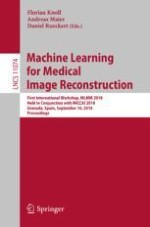
2018 | OriginalPaper | Buchkapitel
Deep Learning Super-Resolution Enables Rapid Simultaneous Morphological and Quantitative Magnetic Resonance Imaging
verfasst von : Akshay Chaudhari, Zhongnan Fang, Jin Hyung Lee, Garry Gold, Brian Hargreaves
Erschienen in: Machine Learning for Medical Image Reconstruction
Aktivieren Sie unsere intelligente Suche, um passende Fachinhalte oder Patente zu finden.
Wählen Sie Textabschnitte aus um mit Künstlicher Intelligenz passenden Patente zu finden. powered by
Markieren Sie Textabschnitte, um KI-gestützt weitere passende Inhalte zu finden. powered by